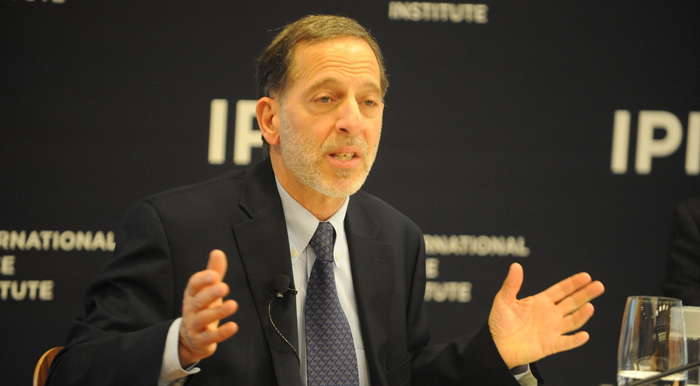
The Israeli-Palestinian conflict has festered for decades, with periodic outbursts of violence, as negotiations mediated by the United States have produced no viable solutions. In Brokers of Deceit: How the U.S. Has Undermined Peace in the Middle East, author Rashid Khalidi examines what he calls the failure of the U.S.’s role as the impartial broker in the peace process. Mr. Khalidi presented his book to an IPI audience at a Beyond the Headlines event on April 2, 2013.
In framing the conversation, he recalled a comment then-Secretary of State Condoleezza Rice made in 2008, to a Palestinian delegation during negotiations with Israel, in which she said, “I want to talk to you, without the Israelis present, so I can tell you what I think of your positions without hurting my role as an honest broker.” What Condolezza Rice was reiterating, he said, was a central myth that the U.S. serves as an honest broker between the two sides.
“American policy has prolonged this conflict, it has exacerbated this conflict. It has made it considerably more intractable,” Mr. Khalidi argued. In the media, the conflict is usually defined as one between a victim and the victimizers, the victim in American political discourse being Israel, he said, going on to assert that the distortion of language, with “vacuous, empty terms like the peace process” has cloaked the real nature of the conflict.
“I think it can be argued, that the high degree of complicity between the United States and Israel – and it has to be described in terms of complicity – should have disqualified the United States from playing the role of intermediary between these two antagonists,” he said.
To explain the reasoning behind using the term complicity, Mr. Khalidi referred to a Memorandum of Understanding which was negotiated between Henry Kissinger and Israel in 1975 during the presidency of Gerald Ford. In it, the U.S. commits itself not to make proposals about the Palestinians without prior warning to the Israeli side, a policy still enforced today, he argued. He tracked this pattern of complicity through three key historic moments.
The first moment he described was the “Reagan Plan” of 1982, after the Camp David Accords. In 1982, after the Israeli invasion of Lebanon, President Reagan saw an opportunity to finally implement the Palestinian autonomy provisions of Camp David. But Israeli Prime Minister Menachem Begin refused to budge from his narrow, reductive interpretation of that autonomy, Mr. Khalidi argued.
“The limits [and] the restrictions that Begin imposed at Camp David provided the very low ceiling that, in the invitation to the peace conference in Madrid, in the letter of assurances to the Palestinian side that went to Madrid, were defined not just by Israel, but by the United States – much more importantly in fact,” he said.
The second moment he covered was the two years of bilateral negotiations behind the Madrid Peace Conference, in which he served as an adviser for the Palestinian delegation. The negotiations were conducted in the Spanish capital and in Washington.
In the third key moment, Mr. Khalidi addressed the first two years of the Obama administration. Coming into office, President Obama started off with a clear position on Israeli settlement freezes as a precondition for negotiations, “on the absolute necessity of rapid movement towards a Palestinian state” based on the 1967 lines, he said. But by the end of his first administration, all he and Israeli Prime Minister Benjamin Netanyahu had talked about was Iran, to the exclusion of Palestine.
These three moments, Mr. Khalidi argued, revealed the true nature of America’s role. “Corrupt, deceitful language has played a crucial role in hiding what has actually been going on,” he said. “This incessantly repeated mantra about a peace process has obscured the reality that whatever process the United States was championing, it did not achieve peace, and I think it was not really directed at achieving peace. It was directed at avoiding conflict with Israel and it was devoted, some people would say, to conflict maintenance, certainly not to conflict resolution.”
He also criticized the conduct of the Arab Gulf countries. “There is no contradiction between American strategic interest involved in an alignment with the Arab oil-producing monarchies and American bias in favor of Israel, since the monarchies do nothing about that bias,” he said. However, “if fundamental and lasting democratization takes place in the Arab world, I would suggest that [this] policy would be untenable,” he added.
On the issue of the Israeli lobby, Mr. Khalidi noted that while it has enormous weight on the Palestinian matter, the U.S. should still be able to dismiss the lobby and pressure Israel to comply with its strategic objectives in the region. “It is really not the Israel lobby that drives American policy,” he noted.
In the end he said, “The policies of this country have not served U.S. national interests. That national interest would in fact be served by a just and lasting resolution of this conflict.”
The event was moderated by Warren Hoge, IPI Senior Adviser for External Relations.
Related coverage:
Rashid Khalidi on the Israel lobby (Mondoweiss, April 3, 2013)
Watch event:







